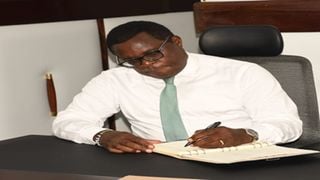
Bungoma Governor Ken Lusaka.
| File | Nation Media GroupPolitics
Premium
Storm as pioneer governors push to scrap term limit, vie for third term in 2027
Pioneer governors who made a comeback in the last General Election, want to run again in 2027, triggering a political storm over the lacuna in law on the two-term limit.
The contention is the interpretation of Article 180 (7) of the Constitution on the election of governor and deputy governor, which states: “A person shall not hold office as a county governor for more than two terms or as a deputy county governor for more than two terms.”
Some of the eight inaugural governors – who recaptured their seats after a five-year hiatus – are advancing an argument that the two terms should be consecutive.
In the event it is staggered, they argue, one can seek for another two terms in office.
They are already plotting to move to the Supreme Court for an interpretation of the clause spelling out their term limit, with an aim of seeking another term that would mean 15 years in office as a governor.
The Saturday Nation has reliably established that this push has since gained traction among some of the county bosses and was recently a matter of deliberations at the Council of Governors (CoG).
The eight governors who recaptured their seats are Joshua Irungu (Laikipia), Ken Lusaka (Bungoma), Simon Kachapin (West Pokot), Ahmed Abdullahi Mohammed (Wajir), Julius Malombe (Kitui), Benjamin Cheboi (Baringo), Issa Timamy (Lamu) and Nathif Jama (Garissa).
The gravity of the matter was brought to fore when Governor Malombe seized an opportunity during Mashuja Day celebration to argue the case,.
Mr Malombe claimed that senior lawyers have told them the two terms should be consecutive, and in the event one loses election after doing a term, they can seek two fresh terms.
He argues that the clause is not clear.
“It should have stated clearly that a governor will serve for two terms whether consecutive or not. Or it should have said clearly that a governor would serve for two terms consecutively; you finish your first term, which is mostly for planning, then you do another five years without a break,” said Mr Malombe.
He said doing two staggered terms should not be interpreted to mean two terms for a governor because they end up starting their development agenda afresh.
Governor Lusaka disclosed that the matter has since been discussed at one of the CoG meetings.
“We need the Supreme Court to give an interpretation because it seems there is a grey area in the clause. It came up in one of our CoG meetings,” said Mr Lusaka.
Kitui Senator Enoch Wambua – whose governor is among those agitating for an extension of their terms – termed the push a circus that should not find itself to the apex court.
“It is within their right to seek constitutional interpretation, but the grey area they are talking about only exists in their minds,” said Mr Wambua.
He added: “I would advise them that instead of using money and time in this pursuit, they should dedicate their time to serving the electorate and wait to retire in 2027.”
Lawyer Bobby Mkangi, who served as a commissioner in the nine-member Committee of Experts for Constitutional Review (CoE) that delivered the 2010 Constitution described the clause as one of the most straightforward.
He said that the intention and meaning of the clause is that you serve for two terms, whether consecutive or staggered.
“It is not an issue that would require anyone to go to the Supreme Court for an interpretation. This is one area where you would confidently say the law is clear,” said Mr Mkangi.
The latest push by the politicians, however, has the potential of opening up a circus that would allow governors to serve more than two terms.
Such an interpretation would also have a bearing on governors who lost in the last poll after serving for one term.
Additional reporting by Kitavi Mutua





